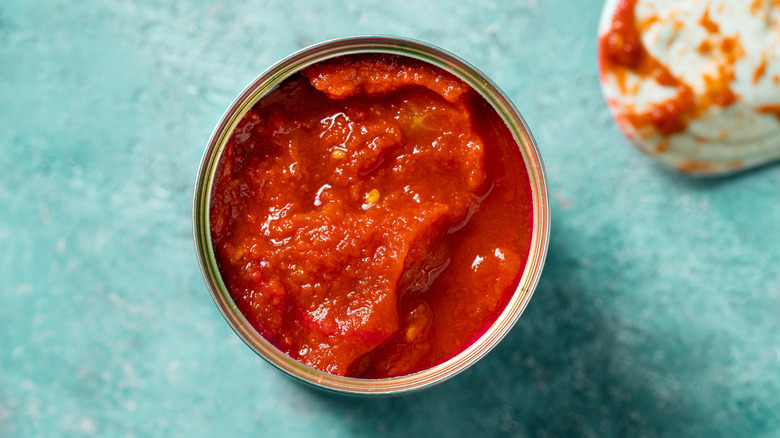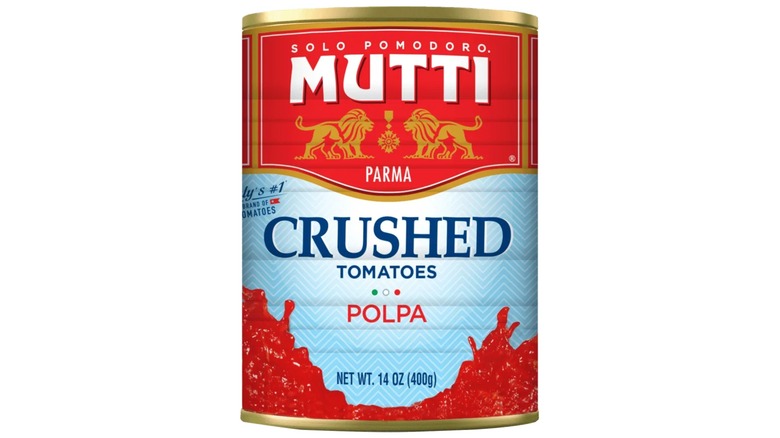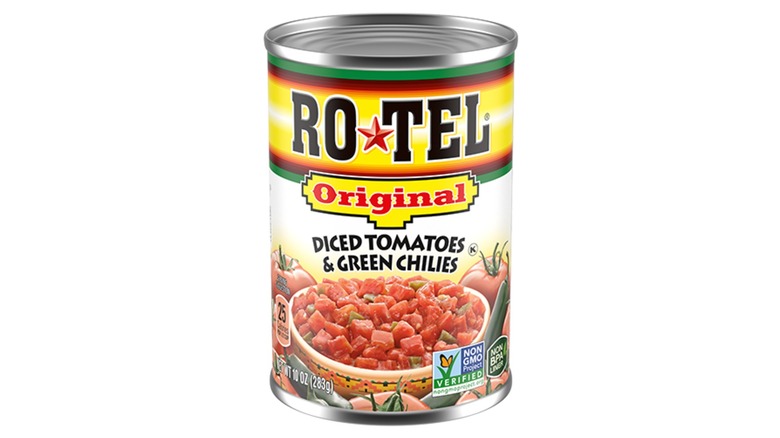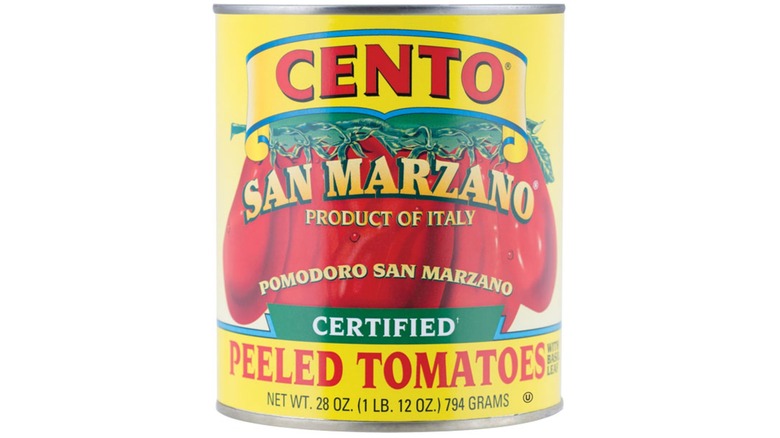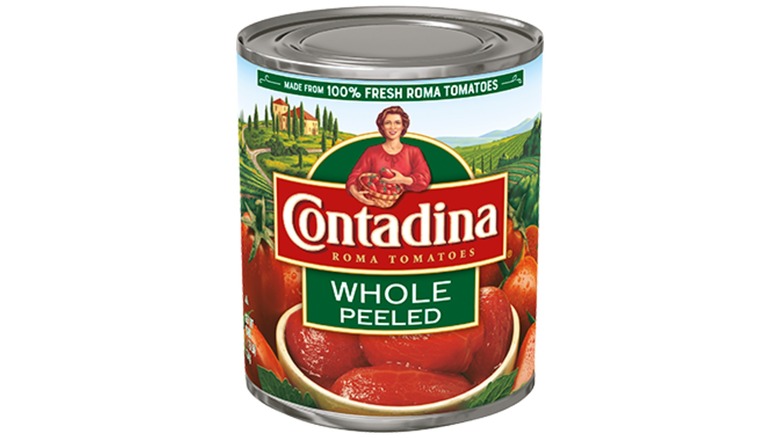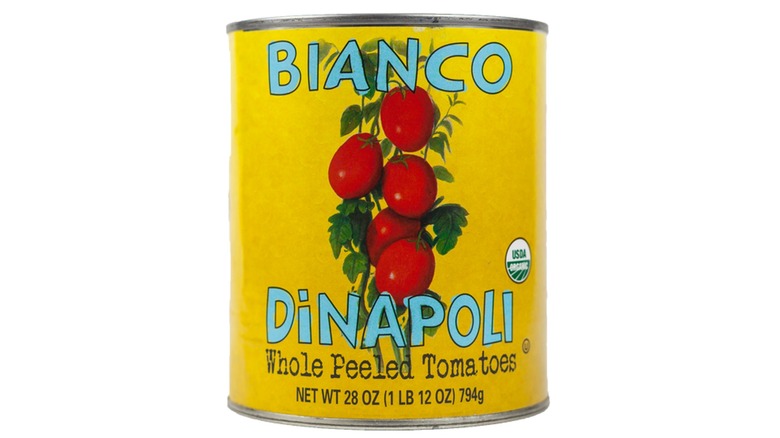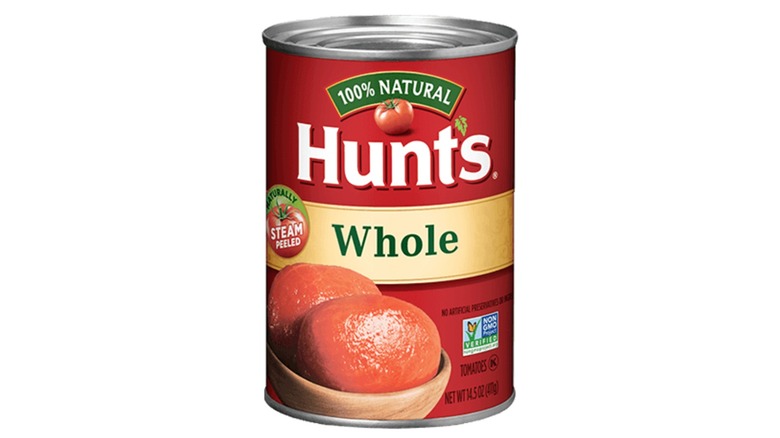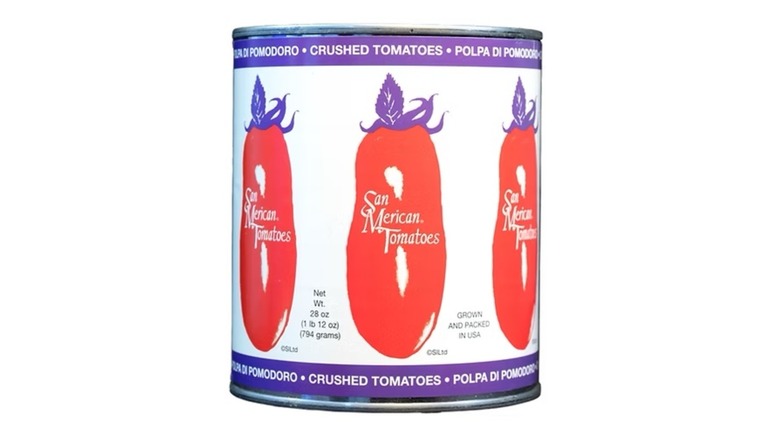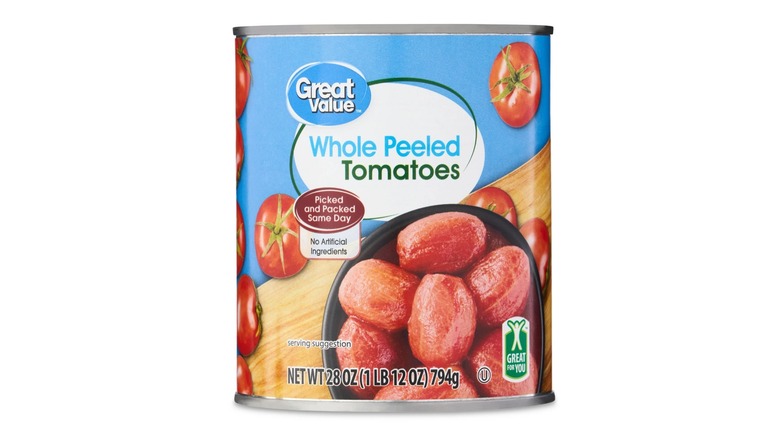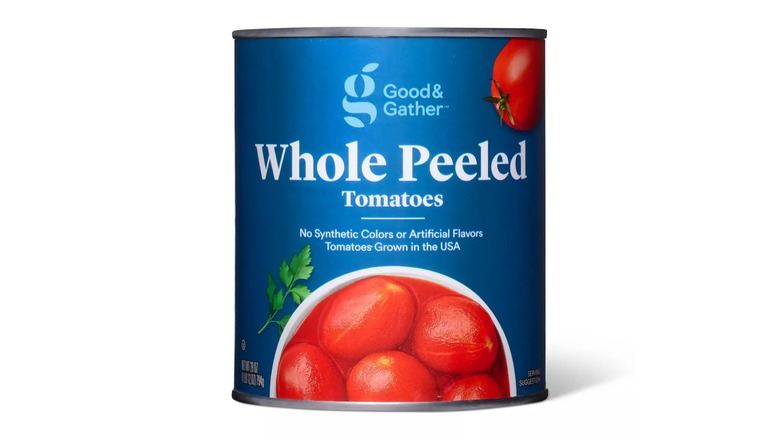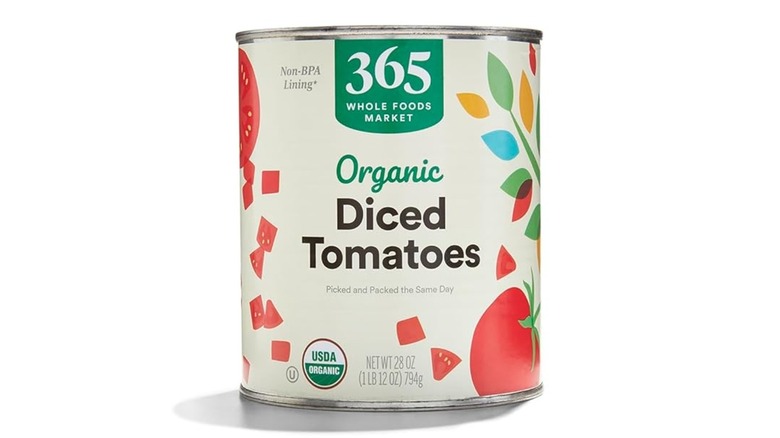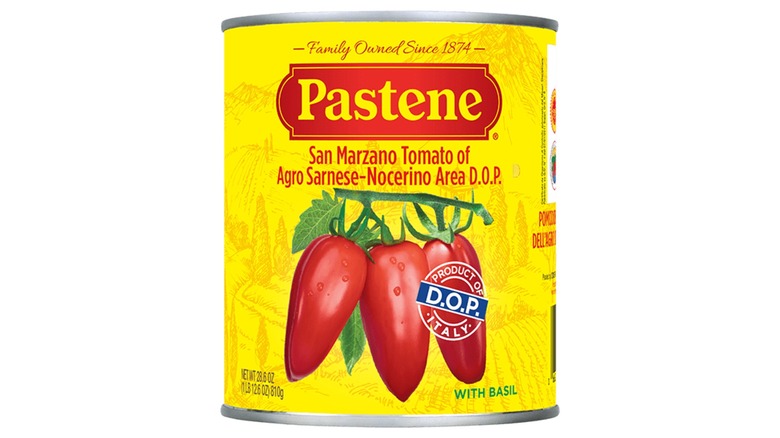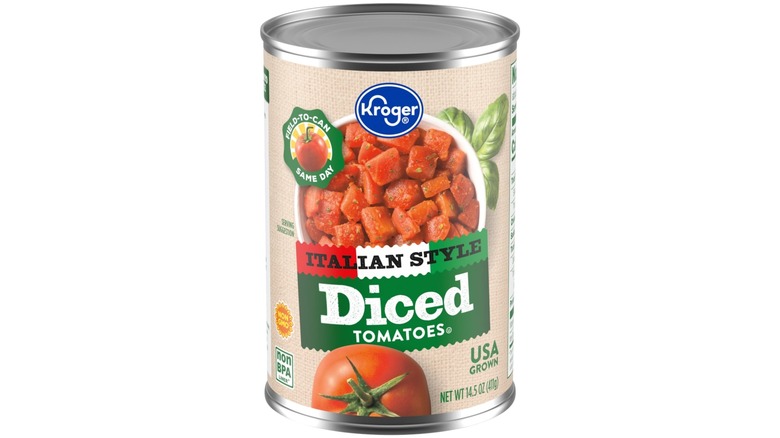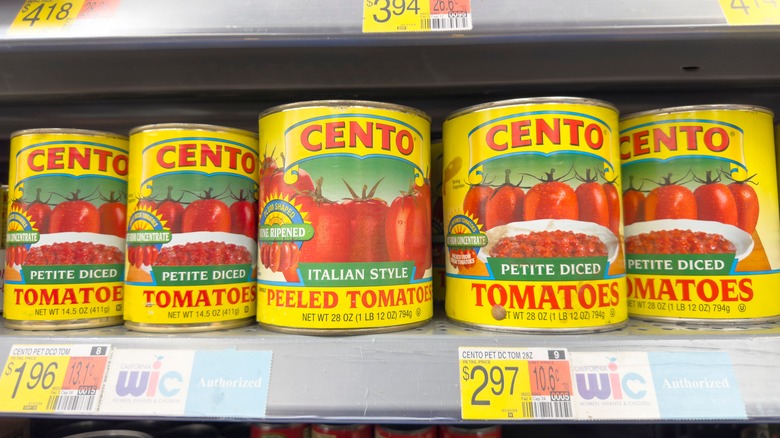6 Canned Tomato Brands That Are Worth Buying And 6 To Avoid
When it comes to kitchen staples, canned tomatoes are your best friend. We've all got at least one can stockpiled in the pantry, ready at a moment's notice for a last-minute pasta sauce or weeknight chili. Of course, nothing beats the big, meaty slices of heirloom tomatoes for summer Caprese salads, but for soups, stews, bruschettas, and a Giada De Laurentiis-approved ricotta dip, the canned varieties are indispensable for amping up that pure and concentrated flavor.
Given that most of us aren't going to make our own — and that even professional chefs rely on canned tomatoes – we need a line-up of go-to brands we can trust. These could include everything from cheaper options for recipes where tomatoes are in the background, to high-quality varieties when tomato is front and center in the dish. Tomatoes from the San Marzano region in Italy are considered some of the best for canning, but more than location, what we're looking for is something thick and saucy, with the perfect balance of sweetness and acidity. It doesn't hurt if they're not overly seasoned, either, so we can work our own magic in the kitchen. So, before you reach out for the cheapest or most familiar brand on the store shelves, take a look through our list of canned tomato brands to buy, and those to avoid.
Buy: Mutti Crushed Tomatoes Polpa
Based in northern Italy, Mutti has been picking and canning tomatoes in the Parma region for an impressive 120 years. According to the brand's website, the tomato enthusiasts have prioritized quality in the products for over a century, and still implement traditional farming techniques like rotating crops for soil rest and regeneration. Before we even get into Mutti's canned tomato products, the company's transparency is refreshing. You can scroll through photos of practically every step of the canning process, from planting seeds to the grocery store shelves.
The can of crushed tomatoes polpa uses only two ingredients — tomatoes and Mediterranean sea salt — but looks almost as thick and hearty as a fully prepared pasta sauce. Mutti cans the tomatoes in their own juices to achieve this consistency, and the pulp is canned and pasteurized at almost 200 F to avoid the use of additives.
Sure, you'll have to spend a little more on Mutti's products (about $7 per 28-ounce can on Amazon), but customers assure that the consistency and taste are worth it. One reviewer wrote, "My family jars their own fresh tomatoes and so far these are the closest I've come to them." In addition, on a Reddit thread ranking canned tomatoes, one user commented, "As an Italian, my fave is Mutti." And if the Italians approve, so do we.
Avoid: Ro-Tel Diced Tomatoes & Green Chiles
Was there even a time when you didn't have a can of Ro-Tel buried in the back of your pantry? It's basically become a kitchen backdrop decoration, kept around for the occasional chili night. Ro-Tel got its start in Texas around the 1950s, and has been canning its iconic tomatoes and green chiles blend ever since. When Lady Bird Johnson came to the White House with husband Lyndon B. Johnson in 1963, she even disclosed that Ro-Tel was the secret ingredient to her acclaimed chili recipe. Maybe things were better in the '60s, but Ro-Tel's current products have got us thinking it belongs on this list of canned foods to avoid at all costs.
Now owned under big parent company ConAgra Foods, Ro-Tel discloses little about its canning processes or where it sources its produce. Although the tomatoes and green chiles are non-GMO, each serving of ½ cup delivers an alarming 380 milligrams of sodium. The cans also use additives like calcium chloride and citric acid, along with the ever-ambiguous "natural flavors." Additionally, customers on the product page complain that something has changed, and the cans seem to have more liquid and less flavor. Ro-Tel undoubtedly represents a cheaper option (just $1.22 for 10 ounces at Walmart), but we're thinking there are better alternatives to forget about in the back of your pantry.
Buy: Cento San Marzano Peeled Tomatoes
If you comb through Reddit to find recommendations for your next can of tomatoes, one name is going to pop up again and again: Cento. One Redditor on a cooking thread summed it up for pretty much everyone, "Cento crushed tomatoes has always been my go to." The brand found its humble beginnings in the 1960s, with a desire to provide high-quality Italian products to American consumers in Philadelphia. After a few name changes, the company settled on Cento in the 1980s and has evolved to become one of America's most recognizable brands of Italian goods.
The ingredients in Cento's canned and peeled tomatoes couldn't be more straightforward, including just San Marzano tomatoes, tomato purée, sea salt, and basil. Nestled on the hills of Mt. Vesuvius, San Marzano refers to an Italian region near Naples, celebrated for its ideal tomato-producing climate. San Marzano tomatoes are plum-shaped and have the highest ratio of fleshy goodness to seed and liquid, while also delivering sweeter and less acidic flavors. As opposed to bearing the official DOP label (Italian for protected designation of origin), Cento's canned tomatoes are only San Marzano certified. Rest assured, Cento is far from brandishing fake San Marzano tomatoes. The company simply may not fulfill all of the DOP's strict requirements, like exact location or traditional processing methods. Considering their quality, the peeled tomatoes go for a reasonable price on Amazon, about $6 for 28 ounces.
Avoid: Contadina Whole Peeled Tomatoes
Italian for "woman of the field," Contadina is another face and brand you're no doubt used to seeing on grocery store shelves. The brand emerged in the early 1900s with the best of intentions – a family of Italian immigrants in New York City providing a taste of home for other Italian-Americans — but over a century later it seems to have lost its touch. Contadina uses Roma tomatoes from California in its can of whole peeled tomatoes, along with a heavy-handed 190 milligrams of sodium per serving. These non-GMO tomatoes are also canned with additives and packed in tomato juice — a sign that you're probably getting a lot more liquid than actual meatiness.
For just $2.18 for a 28-ounce can at Walmart, the affordability reflects poorly in their taste. Tasting Table named the brand's products as some of the worst canned tomatoes, citing an unpleasant blend of both sweetness and bitterness. The tomatoes apparently also have a tougher texture, which could be due to the inclusion of calcium chloride. You'll notice a lot of canned goods have this additive that acts as a firming agent and prevents premature browning. While calcium chloride can indicate that our tomatoes are packed for aesthetics and longevity over freshness and taste, its greatest drawback is that it results in a chewier tomato flesh, depriving you of softer and more easily-mashable tomatoes.
Buy: Bianco diNapoli Organic Whole Peeled Tomatoes
Visually, Bianco DiNapoli's can is a work of art. Quirky, simple, and stylish, it could be displayed as decoration after you've finished its contents — and, according to consumers, these are exactly the type of canned tomatoes you'll be scooping out every last drop. Founded in 2010 by Rob DiNapoli and Chris Bianco, the brand reportedly strives to deliver fresh and flavorful tomatoes from honest and ethical farming practices. The non-GMO tomatoes are harvested at their peak ripeness in California and combined with a few other ingredients, including sea salt, basil, and tomato juice. It's on the saltier side, with 180 milligrams of sodium per ½ cup, and does contain citric acid.
For such a young company, Bianco DiNapoli has definitely not gone unnoticed, coming home with Wirecutter's best canned tomatoes award four years in a row. Enthusiasts applaud the product for its simplicity and satisfying blend of sweetness and acidity, tasty enough to eat straight out of the can. In fact, on a Reddit thread discussing these canned tomatoes, one user mused, "I use half for pizza sauce, and save the other half to dip the pizza in. So good." Although they're relatively more expensive (just under $5 per 28-ounce can on Amazon), it's worth it to shell out a little more for your tomato-forward recipes.
Avoid: Hunt's Whole Peeled Plum Tomatoes
There's no shame in grabbing a familiar (and cheaper) brand off the supermarket shelves when you've got a recipe that calls for canned tomatoes but they're not the star ingredient. Hunt's has certainly carved its name into all things tomato-related since the late 1800s, but you're better off leaving this one at the store. Without even getting into the nitty-gritty of it, this Redditor might have summed it up best: "Something about those tomatoes ain't right." Maybe it's the citric acid and calcium chloride, or maybe it's just the flavor of mass production.
Hunt's tomatoes are packed in tomato juice, which another Redditor on the same thread described more aptly as tomato water, "It's not a rich, purée sauce type deal." With 170 milligrams of sodium per serving, these canned tomatoes also leave you less control over the saltiness of your creations.
For under $2 per 28-ounce can at Walmart, Hunt's is certainly affordable, but compare it to the 2.7-star rating on its product page (the majority of those reviews being one star). Evidently, we're not talking about a great deal. Not only do customers complain about runniness and mushiness, but a surge of recent reviews report an appalling amount of stringy tomato skins, cores, and stems sneaking into the cans.
Buy: San Merican Crushed Tomatoes
If you can't find San Marzano tomatoes or just want to support something a little closer to home, San Merican is a trustworthy candidate to add to your collection. The website reveals little about the company's history except that, "It all started with a boy, a sketch, a field, and a tomato." We're dying to know what this sketch was all about, but perhaps the brand would rather let its product speak for itself. San Merican are some of the best crushed tomatoes due to their sweetness, fullness of flavor, and hearty chunkiness for soups and quick sauces. San Merican's tomatoes are American-grown, and while non-San Marzanos sometimes get a bad rap for being overly acidic, you can always use some kitchen tricks to tone down the acidity.
San Merican's crushed tomatoes do contain calcium chloride, citric acid, and a hefty 140 milligrams of sodium per ¼ cup, so if you're watching your salt intake, go for the "no salt added" varieties. At around $5 per 28 ounces on Amazon, the crushed tomatoes tout a shining 4.8-star rating out of 1,500 reviews. The majority of customers rave that the taste and texture are worth the price.
Avoid: Great Value Whole Peeled Tomatoes
It may come as no surprise that Great Value canned tomatoes ended up on the avoid side of our list, but to be fair, it isn't the most egregious option out there. One of the biggest red flags with big-name store brands, however, is the lack of transparency. The back of the can outlines that these tomatoes are picked by family farmers at peak ripeness and steam packed to avoid the use of artificial ingredients, but there's not a lot to back up these claims. It isn't even clear where the tomatoes are grown.
For $1.26 per 28-ounce can, Great Value will always represent one of the cheapest options at our disposal, but you'll also have to contend with 180 milligrams of sodium per ½ cup serving and the addition of calcium chloride and citric acid. Used to prolong shelf-life and prevent the development of anything nasty in the can, citric acid can also indicate you're not exclusively getting tomatoes. When other ingredients are added — like a watery tomato juice in Great Value's case — citric acid is necessary to maintain safe acidity levels.
Although these whole peeled tomatoes could be a great start for your marinara sauce, about ⅕ of customers on the item's product page slapped it with a 1-star rating. Some of the most recent reviews describe the tomatoes as mushy, sorry, or "sad and disappointing." Several customers also complain that the can is rife with skins.
Buy: Good & Gather Diced Tomatoes
We know — Good & Gather is just another big-name store brand serving up canned tomatoes on its shelves without a lot of clarity about where they come from or how they're packed. But before you call us out on our contradictions, what it really boils down to is taste. Check out the item's product page and you'll see it boasts over 1,000 reviews with 80% of customers awarding it 5 stars. Some of the most recent reviews praise the whole peeled tomatoes for standing up in taste and texture to more expensive name brands.
Speaking of price, you can pick up a 28-ounce container at Target for $1.89, making it one of the best budget canned tomatoes out there. Sure, Good & Gather's offering does deliver 180 milligrams of sodium and the typical canned food additives, so you might not choose to use it for your recipes where tomatoes are the standout ingredient. For rice dishes or stir-frys, when you need just a touch of tomato and don't want to waste your can of DOP San Marzanos, Good & Gather makes for a reliable kitchen staple.
Avoid: Whole Foods 365 Organic Diced Tomatoes
Whole Foods Market has always upheld a bit of a pretentious reputation, but even with all its organic labeling, the brand's can of diced tomatoes doesn't live up to the hype. If anything, it's exactly what you'd expect out of any similarly-priced canned tomatoes. A 28-ounce container will set you back $1.89 at Whole Foods Market, and the diced veggies are packed with tomato juice, calcium chloride, and citric acid. As for sodium content, there's some suspicious discrepancy. Both the 14.5-ounce can on the supermarket's website and the larger option on Amazon list a wild 220 milligrams of sodium per ½ cup serving. The 28-ounce can on the website, however, reads 180 milligrams. Nevertheless, we're either talking about a dose of sodium that's too much, or that is way too much.
Whole Foods Market doesn't give customers the option to review products online, but the can of diced tomatoes surprisingly has a positive rating on Amazon. However, one of the top critical reviewers (titled "tasteless!") wrote, "I ruined a few recipes before I figured out it was these tomatoes! Smells like tomatoes but tastes bland and funky."
Buy: Pastene DOP Tomatoes
If you want a taste of the good life (aka DOP San Marzano tomatoes), Pastene is not going to lead you astray. These tomatoes deliver a sweeter profile and meatier product, stamped with the DOP seal of approval that guarantees they were grown following traditional procedures in one of the world's greatest tomato-growing regions. The company also offers non-San Marzano options, and has been providing Italian goods since 1874, claiming to be the oldest speciality company in North America.
We love that the ingredients couldn't be simpler, including just peeled tomatoes, tomato juice, salt, and basil leaf. Additionally, it only has 100 milligrams of sodium per ½-cup serving. You can buy the canned tomatoes directly from Pastene's website, and if the $6 price tag for 28 ounces makes you hesitate, just remember it's always canned tomato season. When the supermarket tomatoes are looking a little sad, this is the perfect can to grab from the pantry for tomato-forward sauces and soups. The basil can be a little strong when raw, so Pastene canned tomatoes work best when left to simmer and settle flavors.
Avoid: Kroger Italian Style Diced Tomatoes
The next time you're in a pinch and run down to the neighborhood Kroger for some canned tomatoes, you're best off skipping the supermarket's store brand option. They're temptingly cheap — just $1 for the 14.5-ounce can — but they're astonishingly sodium-laden, with 250 milligrams per ½ cup. That's not to mention the usual additive suspects like calcium chloride and citric acid, plus some unusual inclusions like dried garlic and unnamed spices and natural flavors. Is Kroger trying to cover something up with all these extras? Our kitchen recipes typically turn out better when we start with a clean slate and season along the way, rather than letting a product determine how our meal will taste.
The can of Kroger diced tomatoes is labeled with a non-BPA liner, meaning no metallic taste should leak into your canned goods. Nevertheless, one customer took to Reddit to ask for other recommendations, complaining that Kroger's sometimes taste bitter. It goes without saying that these tomatoes are forgettable at best, seeing as no one else in the thread mentioned Kroger again.
Methodology
While we could get into distinctions like whole, crushed, or diced, there's not a lot of variation between one brand of canned tomatoes and the next. In that regard, to establish our list of which cans to buy and which to avoid, we started with brands that consumers are most likely to see on supermarket shelves. In addition, we watched for patterns on forums like Reddit to see which brand names were recommended or mentioned the most. Since Italian tomatoes are regarded as some of the best, we looked for brands that were compared to — or had the label of — San Marzano DOP. We chose whole peeled when possible, for consistency and kitchen versatility.
From there, we narrowed down the list by focusing on simplicity of ingredients and sodium content. Customer reviews and company transparency also influenced the line-up, particularly if the brand detailed where the tomatoes were grown, how they were canned, and if they were packed in their own juices. Some final considerations included price, non-GMO produce, and BPA-free cans.
Static Media owns and operates Tasting Table and The Takeout.
